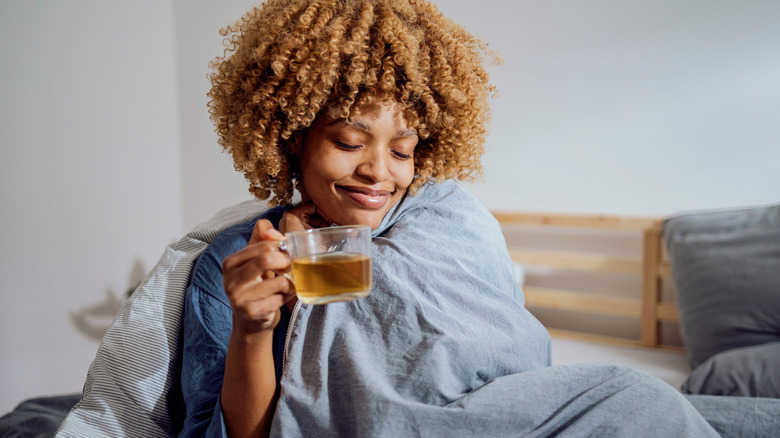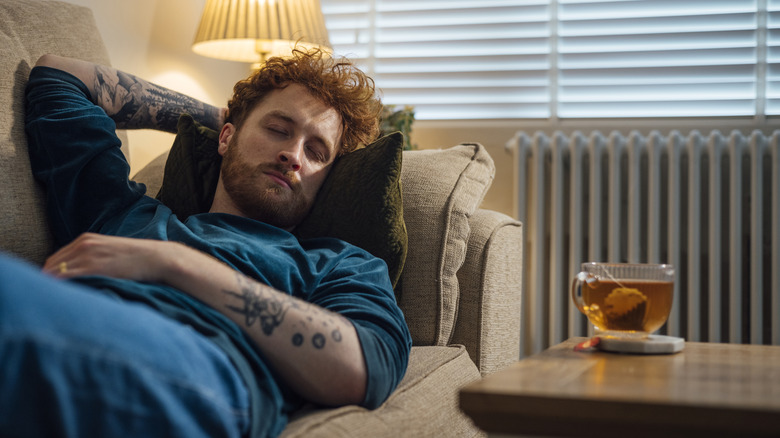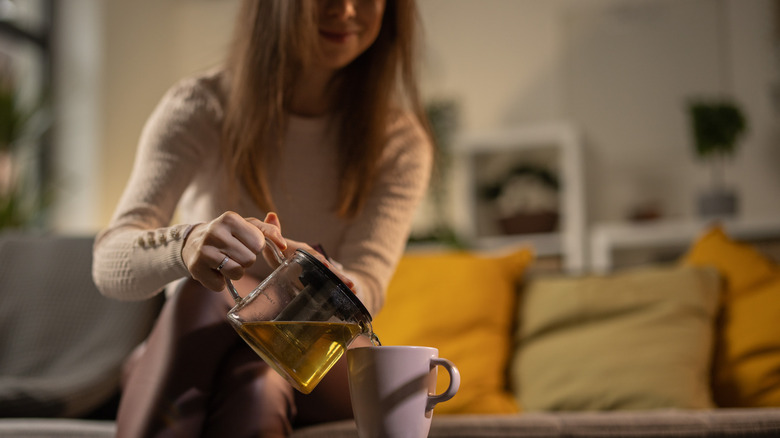The Underrated Kind Of Tea That Can Help Prevent Insomnia So You Sleep Like A Baby
Getting enough rest is essential to your mental and physical health. Unfortunately, though, if you're like 50 million people in the U.S., your rest regularly gets interrupted by a sleep disorder (via Cleveland Clinic). And one of the most common sleep disorders is insomnia.
Far from being just the inability to sleep, insomnia can take on many forms. For example, some insomnia sufferers can get to sleep, but can't stay asleep for long enough. Others can't fall asleep quickly and just toss and turn for hours, only to get a little rest before reawakening. (In other words, it's complex.)
Regardless of which type of insomnia you face, you just want it gone so you can get the recuperative sleep you deserve. And one way to decrease insomnia's impact is by drinking a special tea before bedtime. Though numerous tea varieties and blends have been heralded as potential sleep treatment options, mild-flavored lemon balm tea stands out.
Improving bedtime through late-night teatime
Sipping lemon balm tea before hitting the sack isn't a new sleep-promoting strategy. Lemon balm tea has had a reputation as a sleep aid for centuries. Findings of a 2011 trial published in the Mediterranean Journal of Nutrition and Metabolism revealed a 42% reduction in insomnia responses among participants who ingested a controlled daily dose of a branded Melissa officinalis L (lemon balm) extract. Perhaps more impressively, 85% of subjects reported that their insomnia went into remission.
Since that trial, other studies on lemon balm's effectiveness as a therapeutic to promote restful sleep have had similar results. For example, a 2024 review in Nutrients concluded that there was enough evidence to support lemon balm's promise as a sleep-quality enhancement agent. Also, a clinical trial on mice from 2015 seemed to indicate that taking lemon balm had a hypnotic effect on the animal subjects (via Research in Pharmaceutical Sciences). The mice that were given lemon balm extract fell asleep faster and slept longer than those that were given other types of plant extracts.
In 2021, an eight-week trial published in Revista Brasileira de Ginecologia e Obstetricia examined lemon balm extract's effectiveness on disturbed sleep in menopausal women. Compared to women who consumed either a frequently prescribed antidepressant or a placebo, those who took lemon balm extract reported a higher quality of life, including the quality of their sleep.
Mixing tea types might or might not be a dream come true
While lemon balm extract seems to show success as a natural remedy for warding off insomnia, it might produce even better outcomes when it's not taken alone. In fact, some researchers have hypothesized that lemon balm may be more potent when paired with other plants known for their sleep-improving characteristics. While not all studies support that theory, a few do.
For instance, a 2024 study published in Nature examined the insomnia-defeating effectiveness of an extract combination of lemon balm, valerian, saffron, and L-theanine versus a placebo. Ultimately, participants who took the combined nutriceutical solution saw no difference in their sleep quality compared to those who were given the placebo.
On the other hand, a 2013 study in Complementary Therapies in Clinical Practice saw an improvement in sleep disorders among menopausal women who ingested an extract of lemon balm and valerian root. Therefore, lemon balm tea blends containing other reputedly medicinal plants might be worth some experimentation if you're looking for a natural insomnia solution. There just isn't enough information to know for sure.
Of course, you'll need to be cautious about your lemon balm tea intake. Although lemon balm products like tea and extracts are generally safe for most people, WebMD advises limiting lemon balm use if you're taking sedatives, as you could become excessively drowsy. And if you're taking medications for your thyroid, ask a healthcare professional about possible interactions.


